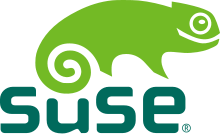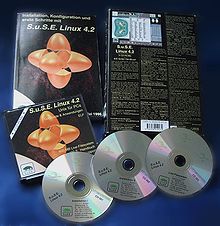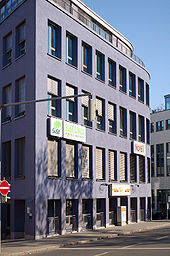- SUSE Linux distributions
-
"SUSE" redirects here. For the university, see Stanford University School of Education.
SUSE Linux (
 /ˈsuːsə/;[1] German: [ˈzuːzə]) is a computer operating system. It is built on top of the open source Linux kernel and is distributed with system and application software from other open source projects. SUSE Linux is of German origin and mainly developed in Europe. The first version appeared in early 1994, making SUSE the oldest existing commercial distribution. It is known for its YaST configuration tool.
/ˈsuːsə/;[1] German: [ˈzuːzə]) is a computer operating system. It is built on top of the open source Linux kernel and is distributed with system and application software from other open source projects. SUSE Linux is of German origin and mainly developed in Europe. The first version appeared in early 1994, making SUSE the oldest existing commercial distribution. It is known for its YaST configuration tool.Novell bought the SuSE brands and trademarks in 2003. Novell, one of the founding members of the Open Invention Network, decided to make the community an important part of their development process by opening widely the distribution development to outside contributors in 2005, creating the openSUSE distribution and the openSUSE Project. Novell employed over 500 developers working on SUSE in 2004.[2] On 27 April 2011, Novell (and SUSE) were acquired by Attachmate.[3]
Contents
History
The developer
Gesellschaft für Software und System Entwicklung mbH (Lit. Company for Software and System Development) was founded on September 2, 1992 in Nuremberg, Germany, by twenty-somethings Roland Dyroff, Thomas Fehr, Burchard Steinbild and Hubert Mantel. Three of the founders were still studying mathematics at a university; Fehr had already graduated and begun work as a software engineer.
The original idea was that the company would develop software and function as an advisory UNIX group. According to Mantel, the group decided to distribute Linux, offering support.
The name "S.u.S.E" was originally a German acronym for "Software und System-Entwicklung", meaning "Software and systems development". However, the full name has never been used and the company has always been known as "S.u.S.E", shortened to "SuSE" in October 1998 and more recently "SUSE".
The official logo and current mascot of the distribution is a veiled chameleon officially named "Geeko" (portmanteau of "Gecko" and "geek") following a competition. Its design has evolved over time.[4]
Origins
The company started as a service provider, which among other things regularly released software packages that included Softlanding Linux System (SLS, now defunct) and Slackware, printed UNIX/Linux manuals, and offered technical assistance. These third party products SUSE initially used had those characteristics and were managed by SUSE in different fashions:
- In mid-1992, Peter MacDonald founded SLS, which offered the first distribution to contain elements such as X and TCP/IP.[citation needed] The company was sending a set of 40 floppy disks containing Slackware to people who wanted to get Linux.
- Slackware (maintained by Patrick Volkerding) was initially based largely on SLS, and the SUSE Linux distribution was originally a German translation of Slackware. In 1994 Patrick Volkerding's scripts were translated, accompanying the original S.u.S.E Linux 1.0 distribution, which was a German version of Slackware, developed in close collaboration with Volkerding. The floppies turned into CDs.
For building its very own distribution of Linux S.u.S.E used the jurix distribution (now defunct) as starting point. This was created by Florian La Roche, who joined the S.u.S.E team, and began to develop YaST, the installer and configuration tool that would become the central point of the distribution.[5]
In 1996, the first distribution under the name S.u.S.E Linux was published as S.u.S.E Linux 4.2. The version number has caused much discussion: it should have been just a version 1.1, but it was the beginning of a new distribution. The number 4.2 was an intentional reference to the answer to the "Big Question about Life, the Universe and Everything" of the H2g2 science fiction novels of the English writer Douglas Adams: The Hitchhiker's Guide to the Galaxy. YaST's first version number, 0.42, came from the same source.
Expansion
Over time, SuSE Linux incorporated many aspects of Red Hat Linux, such as its RPM Package Manager and its file structure.
S.u.S.E. was the largest Linux distributor in Germany. In 1997, SuSE, LLC was established in Oakland, California, for entering the U.S. Linux market. While Red Hat was ubiquitous in the United States, SuSE Linux continued to grow in Germany, but also in Nordic countries such as Finland and Sweden. In October 1998, it was renamed SuSE (without dots). Linus Torvalds, the creator of the Linux kernel, used it himself fairly often. SuSE entered the UK in 1999.
In 2001, the company was forced to significantly reduce its staff to survive.
Novell
On November 4, 2003, Novell announced it would acquire SuSE Linux AG for $210 million.[6] The acquisition was finalized in January 2004.[7]
In a move to more effectively reach its business audience, SuSE introduced the SUSE Linux Enterprise Server in 2001, and changed the company name to SUSE Linux a few months before Novell's purchase.[8] "SUSE" is now a name, not an acronym.
According to J. Philips, Novell's corporate technology strategist for the Asia Pacific region, Novell would not "in the medium term" alter the way in which SUSE was developed.[9] At Novell's annual BrainShare gathering in 2004, all computers ran SUSE Linux for the first time and it was announced that the proprietary SUSE administration program YaST2 would be released under the GPL license.[10]
The openSUSE Project
On August 4, 2005, Novell announced that the SUSE Professional series would become more open, with the launch of the openSUSE Project community. The software had always been open source, but openSUSE opened the development process, allowing developers and users to test and develop it. Previously all development work was done in-house by SUSE. Version 10.0 was the first version that offered public beta testing.
SUSE Linux 10.0 included both open source and proprietary applications and retail boxed-set editions. As part of the change, YaST Online Update server access became free for all SUSE Linux users, and also for the first time, the GNOME desktop was upgraded to equal status with the traditional KDE.
Microsoft agreement
On November 3, 2006 (renewed July 25, 2011), Novell signed an agreement with Microsoft covering improvement of SUSE's interoperability with Microsoft Windows, cross-promotion/marketing of both products and patent cross-licensing . The agreement is considered controversial by part of the Free Software community.[11][12]
Attachmate takeover
On November 22, 2010, Novell announced that it had agreed to be acquired by Attachmate for $2.2 billion. Attachmate plans to operate Novell as two units, SUSE becoming a stand-alone business[13] and anticipates no change to the relationship between the SUSE business and the openSUSE project as a result of this transaction.[14]
The U.S. Department of Justice announced that in order to proceed with the first phase of their acquisition of certain patents and patent applications from Novell Inc., CPTN Holdings LLC and its owners altered their original agreements to address the department's antitrust concerns. The department said that, as originally proposed, the deal would jeopardize the ability of open source software, such as Linux, to continue to innovate and compete in the development and distribution of server, desktop, and mobile operating systems, middleware, and virtualization products. With regard to licensing the patents:
- All of the Novell patents will be acquired subject to the GNU General Public License, Version 2, a widely adopted open-source license, and the Open Invention Network (OIN) License, a significant license for the Linux System;
- CPTN does not have the right to limit which of the patents, if any, are available under the OIN license; and
- Neither CPTN nor its owners will make any statement or take any action with the purpose of influencing or encouraging either Novell or Attachmate to modify which of the patents are available under the OIN license.
The acquisition has been completed on 27 April 2011.[15] Subsequently, on July 23, 2011 Attachmate launched a new website for the SUSE business.
Versions
For EOL, EOS and EOXS (End-of-eXtended-Support) see http://support.novell.com/inc/lifecycle/linux.html
Project Version Date of issue End of life Linux kernel version S.u.S.E Linux (Slackware-based)
3/94 29-03-1994 ??-??-???? 1.0 7/94 ??-07-1994 ??-??-???? 1.0.9 11/94 ??-11-1994 ??-??-???? ?.?.? 4/95 ??-04-1995 ??-??-???? 1.2.9 8/95 ??-08-1995 ??-??-???? ?.?.? 11/95 ??-11-1995 ??-??-???? ?.?.? S.u.S.E Linux 4.2 ??-05-1996 ??-??-???? 2.0.0 4.3 ??-09-1996 ??-??-???? 2.0.18 4.4 ??-05-1997 ??-??-???? 2.0.23(25?) 4.4.1 ??-??-???? ??-??-???? 2.0.28 5.0 ??-07-1997 ??-??-???? 2.0.30 5.1 ??-10-1997 ??-??-???? 2.0.32 5.2 23-03-1998 ??-??-2000 2.0.33 5.3 10-09-1998 ??-??-2000 2.0.35 SuSE Linux 6.0 21-12-1998 ??-??-2000 2.0.36 6.1 07-04-1999 ??-??-2001 2.2.6 6.2 12-08-1999 ??-??-2001 2.2.10 6.3 25-11-1999 10-12-2001 [16] 2.2.13 6.4 09-03-2000 17-06-2002 [17] 2.2.14 7.0 27-09-2000 04-11-2002 [18] 2.2.16 7.1 21-04-2001 16-05-2003 [19] 2.2.18 / 2.4.0 7.2 15-06-2001 01-10-2003 [20] 2.2.19 / 2.4.4 7.3 13-10-2001 15-12-2003 [21] 2.4.9 8.0 22-04-2002 30-06-2004 [22] 2.4.18 8.1 2002-09-30 2005-01-31 [23] 2.4.19 8.2 07-04-2003 14-07-2005 [24] 2.4.20 SUSE Linux 9.0 15-10-2003 15-12-2005 [25] 2.4.21 / 2.6.1 9.1 23-04-2004 30-06-2006 [26] 2.6.4 9.2 25-10-2004 31-10-2006 [27] 2.6.8 9.3 16-04-2005 30-04-2007 [28] 2.6.11 10.0 06-10-2005 30-11-2007 [29] 2.6.13 10.1 11-05-2006 31-05-2008 [30] 2.6.16 10.1bis 13-10-2006 31-05-2008 [30] 2.6.16 openSUSE 10.2 07-12-2006 [31] 30-11-2008 [32] 2.6.18 10.3 04-10-2007 [33] 31-10-2009 [32] 2.6.22 11.0 19-06-2008 [34] 26-06-2010 [32] 2.6.25 11.1 18-12-2008 [35] 14-01-2011 [32] 2.6.27 11.2 12-11-2009 [36] 12-05-2011 [32] 2.6.31 11.3 15-07-2010 [37] 16-01-2012 [32] 2.6.34 11.4 10-03-2011[36] 15-09-2012 [32] 2.6.37 [38] 12.1 16-11-2011[36] 15-05-2013 [32] 3.1 [39] Previous version without supportPrevious version with supportCurrent versionFuture versionSUSE family products
SUSE Linux is available under two brands, openSUSE and SUSE Linux Enterprise. openSUSE is a free, community distribution driven by the openSUSE Project. It includes some of the latest "bleeding edge" Linux technologies and is designed for home users and enthusiasts. SUSE Linux Enterprise is SUSE's tested and certified open-source solution for major enterprises.
openSUSE vs SUSE Linux Enterprise
openSUSE is a freely available, community project that releases versions on a comparatively frequent basis and generally uses the latest versions of the various open source projects that it includes. SUSE Linux Enterprise is SUSE's commercial edition, which SUSE releases much less frequently, enabling it to offer support more effectively for enterprise/production deployments. SUSE typically uses a version of openSUSE as the basis for SUSE Linux Enterprise.
SUSE Linux Enterprise Server vs Desktop
SUSE offers SUSE Linux Enterprise Server and SUSE Linux Enterprise Desktop. Each focuses on packages that fit its specific purpose. For example, SUSE Linux Enterprise Desktop does not include the Apache Web Server, and SUSE Linux Enterprise Server does not include Xgl/Compiz.
openSUSE
- Main articles: openSUSE and openSUSE Project
openSUSE is driven by the openSUSE Project community and sponsored by Novell, to develop and maintain SUSE Linux components. It is the equivalent of the historic "SuSE Linux Professional". After their acquisition of SUSE Linux, Novell has decided to make the community an important part of their development process.
It has a theoretical cycle development of eight months and a lifetime (duration of the critical updates) of 18 months from the date of release. It is fully and freely available for immediate download.
SUSE Linux Enterprise
- Main articles: SUSE Linux Enterprise Server and SUSE Linux Enterprise Desktop
Novell develops multiple products for its "enterprise" business line. These business products target corporate environments, with a higher life cycle (7 years, extendable to 10), a longer development cycle (24 to 36 months), a guarantee of stability at the potential expense of development speed, technical support and certification by independent hardware and software vendors. SUSE Linux Enterprise products are only available for sale (updates fees).
SUSE Linux Enterprise has fewer packages than the openSUSE distribution. Most of the difference are desktop applications which are more suited to consumers than to business. The enterprise products are:
- SUSE Linux Enterprise Server is a server-oriented operating system targeted at corporate environments.
- SUSE Linux Enterprise Real Time is a modified version of SLES supporting low-latency operations where the time factor is critical.
- SUSE Linux Enterprise Desktop is a desktop-oriented operating system targeted at corporate environments.
- SUSE Linux Enterprise Thin Client (SLETC) is a modified version of SLED targeted at thin client terminals.
When installed using a Linux kernel, Novell Open Enterprise Server (OES) uses SUSE Linux Enterprise Server as a platform. This product is also known as OES-Linux.
SUSE Studio
- Main articles: SUSE Studio
See also
Notes
- ^ SUSE Linux Enterprise Desktop 10 Demo
- ^ Arthur Griffith, CompTIA Linux+ Certification (Virtual Training Company, 2004)
- ^ "Novell Completes Merger with Attachmate and Patent Sale to CPTN Holdings LLC". novell.com. http://www.novell.com/news/press/2011/4/novell-completes-merger-with-attachmate-and-patent-sale-to-cptn-holdings-llc.html. Retrieved 28 April 2011.
- ^ Goodbye Dots website
- ^ jurix Readme file
- ^ "Novell to acquire SuSE Linux". CNET news. http://news.cnet.com/2100-7344_3-5101680.html. Retrieved 2009-04-26.
- ^ Kennedy, D. (2003). Novell's Linux buy opens road to top. Retrieved December 20, 2003.
- ^ "SuSE Rebrands Ahead of 9.0 Launch". internetnews.com. http://www.internetnews.com/dev-news/article.php/3085261. Retrieved 2008-03-03.
- ^ Ramesh, R. (2004). Novell: SuSE stays the same, for now. Retrieved January 14, 2004.
- ^ The previous YaST license allowed modification and redistribution but not sale of the code.
- ^ "Microsoft, Novell Extend Controversial Partnership". Webmonkey. 2008-08-20. http://www.webmonkey.com/blog/Microsoft__Novell_Extend_Controversial_Partnership. Retrieved 2009-11-23.
- ^ "Microsoft cannot declare itself exempt from the requirements of GPLv3". Free Software Foundation. 2007-08-28. http://www.fsf.org/news/microsoft_response.
- ^ Novell Agrees to be Acquired by Attachmate Corporation, Novell, November 22, 2010, http://www.novell.com/news/press/novell-agrees-to-be-acquired-by-attachmate-corporation/, retrieved 2010-11-22
- ^ Attachmate Corporation Statement on openSUSE project, Attachmate Corporation, November 22, 2010, http://www.attachmate.com/Press/PressReleases/nov-22-2010-SUSE.htm, retrieved 2010-11-23
- ^ "Novell Completes Merger with Attachmate and Patent Sale to CPTN Holdings LLC". novell.com. http://www.novell.com/news/press/2011/4/novell-completes-merger-with-attachmate-and-patent-sale-to-cptn-holdings-llc.html. Retrieved 28 April 2011.
- ^ SuSE: Version 6.3 end-of-life announcement - The Community's Center for Security
- ^ [SuSE] Support fuer SuSE Linux 6.4 wird eingestellt
- ^ [suse-security] Supported Distributions
- ^ Re Discontinued 7/7.2/7.3 - msg#00105 - linux.suse.security
- ^ Linux Today - End of Life for SuSE Linux 7.2, Mandrake Linux 8.2
- ^ Discontinued SuSE Linux Distributions [LWN.net]
- ^ End of support for SUSE 8.0 [LWN.net]
- ^ Discontinued SUSE Linux Distributions: 8.1
- ^ Discontinued SUSE Linux Distribution: 8.2
- ^ SuSE Security announcements: [suse-security-announce] Discontinued SUSE Linux Distribution: 9.0
- ^ Discontinued SUSE Linux Distribution: 9.1
- ^ Discontinued SUSE Linux Distribution: 9.2
- ^ SUSE Linux 9.3 security support discontinued soon
- ^ [security-announce] Advance notice of discontinuation of SUSE Linux 10.0
- ^ a b [opensuse-announce] Advance notice of discontinuation of SUSE Linux 10.1
- ^ En.opensuse.org
- ^ a b c d e f g h [1]
- ^ En.opensuse.org
- ^ En.opensuse.org
- ^ En.opensuse.org
- ^ a b c openSUSE Roadmap
- ^ openSUSE Roadmap
- ^ [2]
- ^ [3]
References
- Naba Barkakati. SUSE Linux 10 For Dummies. pp. 356. ISBN 978-0471754930.
- Keir Thomas. Beginning SUSE Linux: From Novice to Professional. pp. 544. ISBN 978-1590594582.
External links
Novell Business Service Management - Operations Center
Identity and Systems Management Linux Operating Systems Workgroup Collaboration Projects - AppArmor
- Evolution
- iFolder
- Mono
- openSUSE Project
- YaST
- ZYpp
- Open Build Service
- SUSE Studio ImageWriter
Training and Certification Important people - Major
- Fairclough
- Noorda
- Hovsepian
- Schmidt
Linux distributions Arch Linux · CentOS · Debian · Fedora · Gentoo · Knoppix · Linux Mint · Mandriva Linux · Red Hat Enterprise Linux · Slackware · SUSE · Ubuntu · more…Categories:- SUSE Linux
- RPM-based Linux distributions
- Software companies of Germany
Wikimedia Foundation. 2010.



